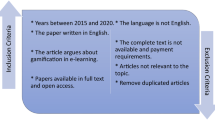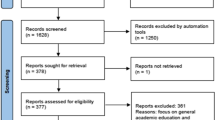Abstract
Game-based learning refers to establishing learning environments that involve digital or non-digital games to enhance students’ knowledge and skill acquisition. Previous studies indicated that game-based learning is superior to the conventional instructional method, but few compared the differences between different game types. This study examined the effects of game-based learning on Chinese middle school students’ learning of science and their self-efficacy. We implemented an experiment to compare the effects between digital and non-digital game-based learning. Our results showed that students in game-based learning groups performed significantly better in the content knowledge assessment and reported higher self-efficacy than the traditional lecture group. No significant difference was found between the digital and non-digital game groups when considering science learning performance, but students of the digital game group showed significantly higher self-efficacy than those of the non-digital game group. Implications of the findings for future research and practice of game-based learning are discussed.





Similar content being viewed by others
References
Amineh, R. J., & Asl, H. D. (2015). Review of constructivism and social constructivism. Journal of Social Sciences, Literature and Languages, 1(1), 9–16.
Anseel, F., Lievens, F., & Schollaert, E. (2009). Reflection as a strategy to enhance task performance after feedback. Organizational Behavior and Human Decision Processes, 110(1), 23–35. https://doi.org/10.1016/j.obhdp.2009.05.003.
Bandura, A. (1982). Self-efficacy mechanism in human agency. American Psychologist, 37, 122–147. https://doi.org/10.1037/0003-066X.37.2.122.
Bandura, A. (1994). Self-efficacy. In V. S. Ramachandran (Ed.), Encyclopedia of human behavior (Vol. 4, pp. 71–81). New York: Academic Press.
Berland, M. (2011). Understanding strategic boardgames as computational-thinking training machines. Tabletop analog game design (pp. 167–173). Pittsburgh: ETC Press.
Brom, C., Preuss, M., & Klement, D. (2011). Are educational computer micro-games engaging and effective for knowledge acquisition at high-schools? A quasi-experimental study. Computers & Education, 57(3), 1971–1988. https://doi.org/10.1016/j.compedu.2011.04.007.
Cardinot, A., & Fairfield, J. A. (2019). Game-based learning to engage students with physics and astronomy using a board game. International Journal of Game-Based Learning, 9(1), 42–57. https://doi.org/10.4018/IJGBL.2019010104.
Chen, G., Gully, S. M., & Eden, D. (2001). Validation of a new general self-efficacy scale. Organizational Research Methods, 4(1), 62–83. https://doi.org/10.1177/109442810141004.
Chen, C. H., & Law, V. (2016). Scaffolding individual and collaborative game-based learning in learning performance and intrinsic motivation. Computers in Human Behavior, 55, 1201–1212. https://doi.org/10.1016/j.chb.2015.03.010.
Chen, F., Shi, Y., & Xu, F. (2009). An analysis of the Public Scientific Literacy study in China. Public Understanding of Science, 18(5), 607–616. https://doi.org/10.1177/0963662508093089.
Chen, C.-H., Wang, K.-C., & Lin, Y.-H. (2015). The comparison of solitary and collaborative modes of game-based learning on students’ science learning and motivation. Educational Technology & Society, 18(2), 237–248.
Cheng, M. H. M., & Wan, Z. H. (2016). Unpacking the paradox of Chinese science learners: Insights from research into Asian Chinese school students’ attitudes towards learning science, science learning strategies, and scientific epistemological views. Studies in Science Education, 52(1), 29–62. https://doi.org/10.1080/03057267.2015.1112471.
Cook, D. H. (2014). Conflicts in chemistry: The case of plastics, a role-playing game for high school chemistry students. Journal of Chemical Education, 91(10), 1580–1586. https://doi.org/10.1021/ed4007277.
Dahlin, B., & Watkins, D. (2000). The role of repetition in the processes of memorising and understanding: A comparison of the views of German and Chinese secondary school students in Hong Kong. British Journal of Educational Psychology, 70(1), 65–84. https://doi.org/10.1348/000709900157976.
Dunning, D. (2011). The Dunning–Kruger effect: On being ignorant of one's own ignorance. In Advances in experimental social psychology (Vol. 44, pp. 247–296). New York: Academic Press.
Gao, H., He, W., Zhang, C., & Ren, L. (2016). Building scientific literacy in China: Achievements and prospects. Science Bulletin, 61(11), 871–874. https://doi.org/10.1007/s11434-016-1076-0.
Goldenberg, D., Andrusyszyn, M.-A., & Iwasiw, C. (2005). The effect of classroom simulation on nursing students' self-efficacy related to health teaching. Journal of Nursing Education, 44(7), 310.
Hamari, J., Shernoff, D. J., Rowe, E., Coller, B., Asbell-Clarke, J., & Edwards, T. (2016). Challenging games help students learn: An empirical study on engagement, flow and immersion in game-based learning. Computers in Human Behavior, 54, 170–179. https://doi.org/10.1016/j.chb.2015.07.045.
Hung, C. M., Huang, I., & Hwang, G. J. (2014). Effects of digital game-based learning on students’ self-efficacy, motivation, anxiety, and achievements in learning mathematics. Journal of Computers in Education, 1(2–3), 151–166. https://doi.org/10.1007/s40692-014-0008-8.
Johnson, C. I., & Mayer, R. E. (2010). Applying the self-explanation principle to multimedia learning in a computer-based game-like environment. Computers in Human Behavior, 26(6), 1246–1252. https://doi.org/10.1016/j.chb.2010.03.025.
Khan, A., Ahmad, F. H., & Malik, M. M. (2017). Use of digital game based learning and gamification in secondary school science: The effect on student engagement, learning and gender difference. Education and Information Technologies, 22(6), 2767–2804. https://doi.org/10.1007/s10639-017-9622-1.
Kiili, K. (2005). Digital game-based learning: Towards an experiential gaming model. The Internet and Higher Education, 8(1), 13–24. https://doi.org/10.1016/j.iheduc.2004.12.001.
Leonard, J., Buss, A., Gamboa, R., Mitchell, M., Fashola, O. S., Hubert, T., et al. (2016). Using robotics and game design to enhance children’s self-efficacy, STEM attitudes, and computational thinking skills. Journal of Science Education and Technology, 25(6), 860–876. https://doi.org/10.1007/s10956-016-9628-2.
Li, Y., Huang, Z., Jiang, M., & Ting-Wen, C. (2016). The effect on pupils' science performance and problem-solving ability through Lego: An engineering design-based modeling approach. Journal of Educational Technology & Society, 19(3), 143–156.
Liang, L. L., Liu, X., & Fulmer, G. W. (Eds.). (2017). Chinese science education in the 21st century: Policy, practice, and research. Dordrecht: Springer. https://doi.org/10.1007/978-94-017-9864-8
Lin, C. H., Liu, E. Z. F., Chen, Y. L., Liou, P. Y., Chang, M., Wu, C. H., et al. (2013). Game-based remedial instruction in mastery learning for upper-primary school students. Journal of Educational Technology & Society, 16(2), 271–281.
Liu, E. Z. F., & Chen, P. K. (2013). The effect of game-based learning on students’ learning performance in science learning-A case of “conveyance go”. Procedia-Social and Behavioral Sciences, 103, 1044–1051. https://doi.org/10.1016/j.sbspro.2013.10.430.
Lu, Y. L., & Lien, C. J. (2019). Are they learning or playing? Students’ perception traits and their learning self-efficacy in a game-based learning environment. Journal of Educational Computing Research. https://doi.org/10.1177/0735633118820684.
McLaren, B. M., Adams, D. M., Mayer, R. E., & Forlizzi, J. (2017). A computer-based game that promotes mathematics learning more than a conventional approach. International Journal of Game-Based Learning (IJGBL), 7(1), 36–56. https://doi.org/10.4018/IJGBL.2017010103.
Meluso, A., Zheng, M., Spires, H. A., & Lester, J. (2012). Enhancing 5th graders’ science content knowledge and self-efficacy through game-based learning. Computers & Education, 59(2), 497–504. https://doi.org/10.1016/j.compedu.2011.12.019.
Morris, T. A. (2011). Go chemistry: A card game to help students learn chemical formulas. Journal of Chemical Education, 88(10), 1397–1399. https://doi.org/10.1021/ed100661c.
Mustafa, J., Khan, A., & Ullah, A. (2011). Investigating student’s achievement in mathematics through non technological game based teaching. International Journal of Scientific Research in Education, 4(3–4), 151–164.
Naik, N. (2014). A comparative evaluation of game-based learning: Digital or non-digital games?. In European Conference on Games Based Learning (Vol. 2, p. 437). Academic Conferences International Limited.
Prensky, M. (2001). Digital game-based learning. New York: McGraw-Hill. https://doi.org/10.1145/950566.950567.
Qian, M., & Clark, K. R. (2016). Game-based learning and 21st century skills: A review of recent research. Computers in Human Behavior, 63, 50–58. https://doi.org/10.1016/j.chb.2016.05.023.
Safaria, T., & Ahmad, A. (2013). Effects of self-efficacy on students academic performance. Journal of Educational, Health and Community Psychology, 2(1), 22–29. https://doi.org/10.12928/jehcp.v2i1.3740.
Sung, H. Y., & Hwang, G. J. (2013). A collaborative game-based learning approach to improving students' learning performance in science courses. Computers & Education, 63, 43–51. https://doi.org/10.1016/j.compedu.2012.11.019.
Tan, P. H., Ling, S. W., & Ting, C. Y. (2007). Adaptive digital game-based learning framework. In Proceedings of the 2nd international conference on Digital interactive media in entertainment and arts (pp. 142–146). ACM.
Tapscott, D. (1998). Growing Up Digital: The Rise of the Net Generation. New York: McGraw-Hill.
Uzun, L., Çetinavci, U. R., Korkmaz, S., & Salihoglu, U. M. (2013). Developing and applying a foreign language vocabulary learning and practicing game: The effect of VocaWord. Digital Culture & Education, 5(1), 50–70.
von Gillem, S., & Alaswad, Z. (2016). Games and game-based learning in instructional design. International Journal of Technologies in Learning, 23(4), 1–7. https://doi.org/10.18848/2327-0144/CGP/v23i04/1-7.
Wang, S. Y., Chang, S. C., Hwang, G. J., & Chen, P. Y. (2018). A microworld-based role-playing game development approach to engaging students in interactive, enjoyable, and effective mathematics learning. Interactive Learning Environments, 26(3), 411–423. https://doi.org/10.1080/10494820.2017.1337038.
Yien, J. M., Hung, C. M., Hwang, G. J., & Lin, Y. C. (2011). A game-based learning approach to improving students' learning achievements in a nutrition course. Turkish Online Journal of Educational Technology-TOJET, 10(2), 1–10.
Yükseltürk, E., Altıok, S., & Başer, Z. (2018). Using game-based learning with kinect technology in foreign language education course. Journal of Educational Technology & Society, 21(3), 159–173.
Yusuf, M. (2011). The impact of self-efficacy, achievement motivation, and self-regulated learning strategies on students’ academic achievement. Procedia-Social and Behavioral Sciences, 15, 2623–2626. https://doi.org/10.1016/j.sbspro.2011.04.158.
Zhao, Z., & Thomas, G. P. (2016). Mainland Chinese students conceptions of learning science: A phenomenographic study in Hebei and Shandong Provinces. International Journal of Educational Research, 75, 76–87. https://doi.org/10.1016/j.ijer.2015.11.008.
Author information
Authors and Affiliations
Corresponding author
Additional information
Publisher's Note
Springer Nature remains neutral with regard to jurisdictional claims in published maps and institutional affiliations.
Rights and permissions
About this article
Cite this article
Wang, M., Zheng, X. Using Game-Based Learning to Support Learning Science: A Study with Middle School Students. Asia-Pacific Edu Res 30, 167–176 (2021). https://doi.org/10.1007/s40299-020-00523-z
Published:
Issue Date:
DOI: https://doi.org/10.1007/s40299-020-00523-z




